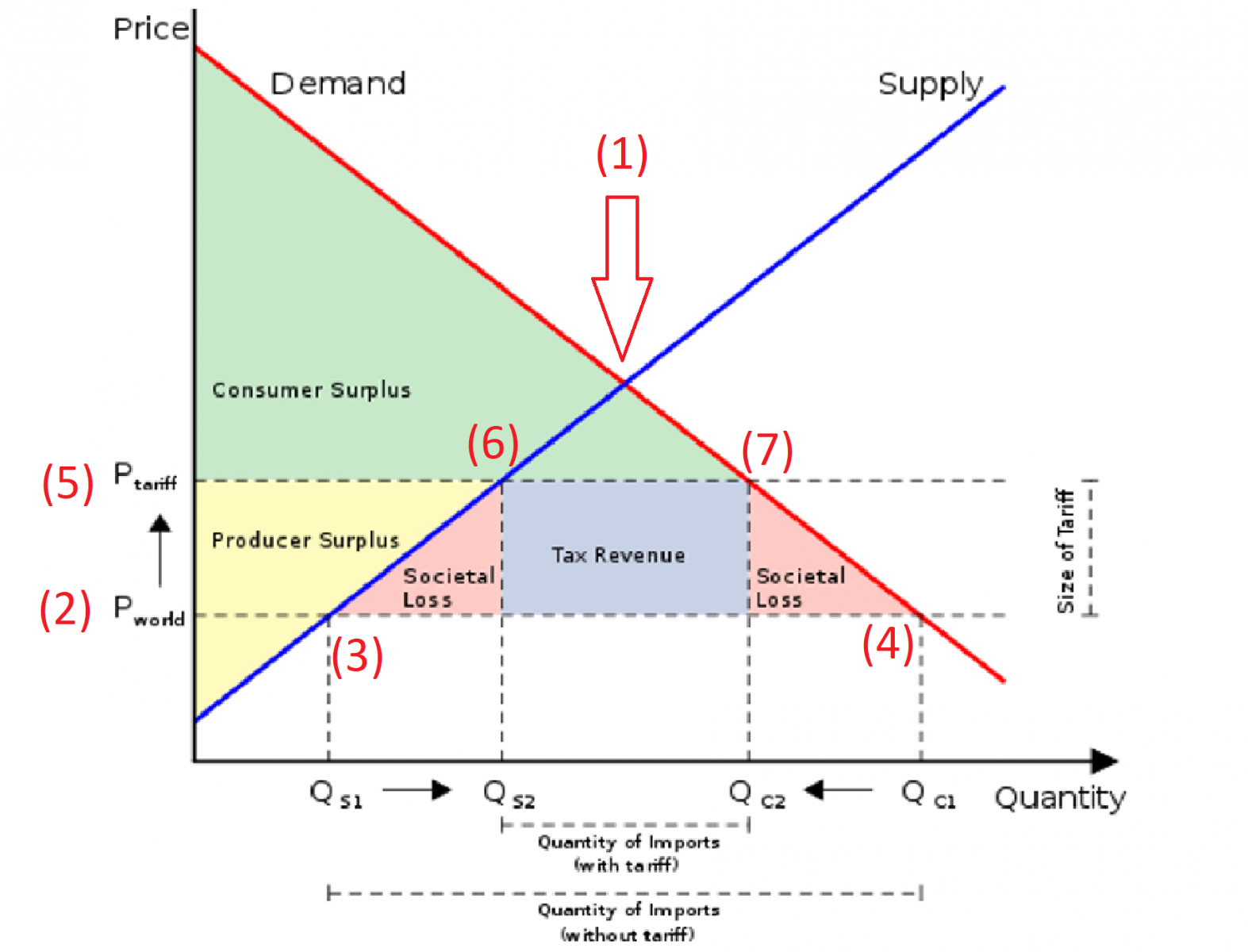The History of Trade Tariffs and the Effect on Economies
The past few months, U.S. President Donald Trump has increased his rhetoric of trade tariffs on goods imported to the U.S. from other countries, including Canada, Mexico, and the European Union. As of this past Friday, July 6th, a full trade war with China ensued as China promptly retaliated with its own tariffs on U.S. goods dollar for dollar, while stating that they will not back down if the President continues to raise the ante.
We know from history and economic principles that trade tariffs cause inefficiencies. However the President believes that the U.S. will be the winner in a trade war, even if it means losing less than other countries. For Canada, the President happens to be right. Trade matters more to Canada than it does the U.S., as more of our economy is reliant on exporting goods as percentage of Gross Domestic Product (GDP). Thus, the U.S. will suffer less in terms of job losses and a decline of GDP relative to Canada.
The question waning is how far will the President push trade tariffs and what will the effect be on global economies?
The Economics of Tariffs
Having studied economics and accounting, I am the first to say that basic economic principles at first are dry, at best. However, in hindsight, I learned that to understand many aspects of economies, including the effect of trade tariffs, requires an understanding of basic principles.
 The chart above analyzes the effect of an import tariff on any item let's say tomatoes for this discussion.
The chart above analyzes the effect of an import tariff on any item let's say tomatoes for this discussion.
If tomatoes were only produced and consumed in the domestic country, the price and quantity would be at point (1), where supply and demand intersect. Since other countries produce tomatoes more efficiently, thus cheaper, the world price is lower at point (2).
At the lower price of tomatoes, point (2), the country is willing to produce (supply) tomatoes of the quantity at point (3), and people in the country are willing to purchase more tomatoes, the quantity at point (4). As a result, the country imports tomatoes from point (4) less what it produces at point (3).
When a tariff is imposed on imported tomatoes, the price of tomatoes in the country increases to point (5). At the higher price, more local farmers are willing to grow tomatoes, thus, the local supply produced increases to point (6), from point (3). At the higher price less people in the country are willing to buy tomatoes and the local demand decreases to point (7) from point (4). Â Also, the amount of imported tomatoes decrease.
As a result,
some local farmers benefit from the higher prices (yellow region),
the government generates tax revenue from import tariffs (blue region),
consumers are worse off because the consumer surplus (green region) becomes smaller, and,
the overall economy has a societal loss (pink region) from the inefficiencies created by the tariffs. Removing the tariff and having free trade would be a net gain for society because the losses from trade restrictions are larger than the gains from trade restrictions. Free trade creates winners and losers, but theory and empirical evidence show that the benefits from free trade are larger than the losses.
History of Trade Tariffs in the United States
Economic principles are built on understanding history and researching the cause and effect various factors have on the economy. Let's look a historical overview of the effect tariffs have had on the U.S. economy.
Before the 1930's, America's trade policy was set by Congress alone. The U.S. did not consider international trade negotiations. At the time, the government was acting emotionally in a protectionist mode. The government responded to the Great Depression by passing the Smoot-Hawley Tariff Act of 1930 raising tariffs on imports from Japan. The act was intended to protect American industry from foreign competition.
As a result, many trading partners increased their tariffs on U.S. goods, essentially closing down international trade and negatively affecting the economy and prolonging the economic downturn. Globally, GDP of countries were declining, there was wide-scale unemployment, and increased unrest; which spurred growth of militarism and eventually World War II.
A thorough narrative of U.S. tariff history can be read at the Centre for Trade Policy Studies (CATO).
In 1934, the U.S. and other countries realized the impact of tariffs, whereby the Reciprocal Trade Agreements Act of 1934 was signed. The act granted the U.S. President authority to reduce tariffs with foreign governments. Finally, U.S. trade policy was economically strategic and global, albeit this new view took decades to effectively be implemented to a point where global economies garnished the benefits of free[-er] trade.
This new approach was further adopted through successor agreements internationally, and eventually resulted in the creation of the World Trade Organization (WTO) in 1995.
Reciprocity is a basic principle of trade agreements. A country liberalizes its trade policies in exchange for another country liberalizing their trade policies resulting in free trade. These agreements overcome protectionist pressures and recognize that trade is a global phenomenon that overcomes inefficiencies of internal dependence and utilizes the comparative advantage of one another to provide that all countries be better off. i.e. if you can produce tomatoes more effectively than I can, and we can advise you on your financial planning more effectively, then we both are better off by specializing in our area of expertise and trading.
It's well known that history repeats itself, and the dangers of ignoring history are only beginning to manifest themselves. I hope that cooler heads prevail. And sooner rather than later.
"Free trade, one of the greatest blessings which a government can confer on a people, is in almost every country unpopular."
- Thomas Babington Macaulay, (1824)
"If soldiers are not to cross international boundaries, goods must do so. Unless shackles can be dropped from trade, bombs will be dropped from the sky."
- Otto T. Mallery, (1941)
Andrew Brydon, CPA, CA
Wealth Counsellor



